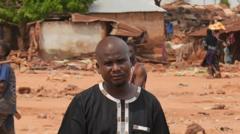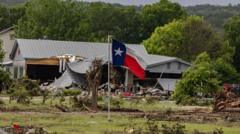The floods in Mokwa, Nigeria, have resulted in over 200 fatalities and widespread destruction. Survivors recount traumatic experiences of loss, while local officials suspect underlying causes beyond heavy rainfall. As recovery efforts begin, the community grapples with grief and uncertainty about future rainfall risks.
"Tragedy Strikes as Devastating Floods Claim Lives and Homes in Nigeria"

"Tragedy Strikes as Devastating Floods Claim Lives and Homes in Nigeria"
In north-central Nigeria, catastrophic floods have led to significant loss of life and property. Victims share harrowing accounts as communities come together amidst despair.
Adamu Yusuf's world has been shattered following the horrific floods that ravaged Tiffin Maza, a community in north-central Nigeria, taking away nine of his family members, including his wife and newborn baby. The flooding struck his home early Thursday, drowning his loved ones as he desperately tried to gather them together in the chaos. "She was the one that woke me up when the flood hit," Yusuf, 36, recalled. The tragedy unfolded swiftly, leaving families torn apart and communities devastated.
As of Sunday, local authorities have confirmed over 200 deaths linked to the floods—an alarming increase from 110 reported just two days earlier. Residents fear that the toll could continue to rise as search efforts continue. "I watched helplessly as water washed away my family. I survived because I could swim. It was God that saved me," Yusuf shared, grappling with unspeakable pain and loss.
The aftermath of the floods has left Tiffin Maza in utter despair, with remnants of belongings strewn across the landscape, structures ruined, and entire communities displaced. The haunting sight of the community serves as a grim reminder of the floods' destruction. Yusuf lamented the loss of not only his family but also his home, sharing, "I lost everything to this flood."
Among those mourning is Isa Muhammed, a 19-year-old who lost his beloved teacher and several of his family members to the catastrophe. "Two have been found dead; one of them was his baby," he reported, his voice trembling. Grief washed over the community as residents offered condolences and assistance in recovery efforts amid the foul odor of buried bodies under thick mud.
Ramat Sulaiman, 65, shared her harrowing experience of witnessing children in a Quranic school being swept away. "It was a painful sight for me... the children cried for help," she said, now left homeless along with her family. The recollections of loss and trauma weighed heavily on the hearts of numerous victims, some struggling with nightmares of the tragedy.
Speculation surrounds the possibility that a dam may have broken, exacerbating the catastrophic flooding. Local officials have advised that a reservoir in the region could overflow during rains, yet they emphasize that the magnitude of this flood was extraordinary. Many residents insisted that the flood's onset did not align with the heavy rainfall they had recently experienced, raising unanswered questions about its origins.
As communities attempt to recover, the National Emergency Management Agency has begun treating the injured and relocating those displaced to relief camps. With forecasts predicting an extended rainy season, the specter of further flooding looms over residents of Niger state and other areas at risk. Despite their efforts to begin rebuilding, survivors like Yusuf express that the emotional pain may never fully heal.





















